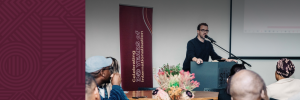
PhD candidates learn secrets to success at ADA winter school networking event
As part of its 2023 hybrid winter school, the African Doctoral Academy (ADA) in Stellenbosch University (SU) International hosted a networking event on 11 July. Guests comprised doctoral candidates, supervisors and researchers who were attending the winter school from 3 to 21 July at the Stellenbosch Institute for Advanced Study (STIAS).
For his engaging talk, guest speaker Prof Sebastian Kernbach from the University of St Gallen, Switzerland, drew on his experience as visiting professor at Stanford University and his involvement at the United States National Aeronautics and Space Administration (NASA). Themed “Design your future: Three keys to surviving, mastering and thriving on the PhD journey – learnings from ADA, Stanford and NASA", the talk emphasised personal contribution, creativity and holistic intelligence as crucial for successful doctoral studies.
“What is the personal contribution you want to make to your family, community and country through your PhD?" he asked. “If you reconnect to why you are doing what you are doing, it will keep you going when the going gets tough. Secondly, research is a process of uncertainty, and because of this, we have to work creatively by diverging – creating ideas – and converging – selecting ideas and options. Lastly, consider IQ researcher Robert Sternberg's model of successful human intelligence and use its pillars of analytical, creative and practical intelligence not only for your PhDs, but also for your role as a human being on this planet."
The annual ADA winter and summer schools at SU offer high-impact training in research design and methodology, academic preparedness and career development for PhD candidates and their supervisors. “There is a compelling case in Africa for supporting PhD candidates, as we do not produce as many doctoral graduates as we'd like," says Dr Mmampho Gogela-Smith, senior programme manager at SU International's Africa Centre for Scholarship. “And that is exactly what we are trying to do through the ADA winter school programme. We also hope that participants would make use of this opportunity to network and form partnerships."
The 2023 edition of the ADA winter school is the first fully hybrid version, presented 50% online and 50% in face-to-face format. “The hybrid mode provides a convenient option for those who face financial challenges or are tied up with work commitments and are unable to attend in person," explains Dr Natalie Kowalik, ADA programme manager at SU International. With over 350 applications submitted from hopeful participants from South Africa, the rest of Africa and beyond, interest in the winter school was overwhelming. “More than 200 participants, some of them scholarship recipients, are joining the online and in-person courses. They hail from Nigeria, South Africa, Kenya, Uganda, Namibia, Tanzania and Zimbabwe, to name just a few," Natalie adds.
Participant Lawson Naidoo, a lecturer and doctoral supervisor at Tshwane University of Technology, says his university enrolled him for the ADA winter school in order to build his capacity and skills as a supervisor. He is especially looking forward to learning fresh perspectives and good practices in the workshop “Good practice in postgraduate research supervision".
Fellow winter school enrollee Siyabonga Rayise, a PhD student from Vaal University of Technology, says he was drawn to the programme because, judging by the content, it could add value to his studies. He is particularly interested in the course “How to write an effective literature review for your doctorate". “I hope it will equip me with more skills and tools to help me write my literature review," he says.
Since inception in 2009, the ADA's schools have hosted more than 5 500 prospective and current doctoral candidates and their supervisors from 53 countries in Africa and beyond, including Europe, Asia and America.
